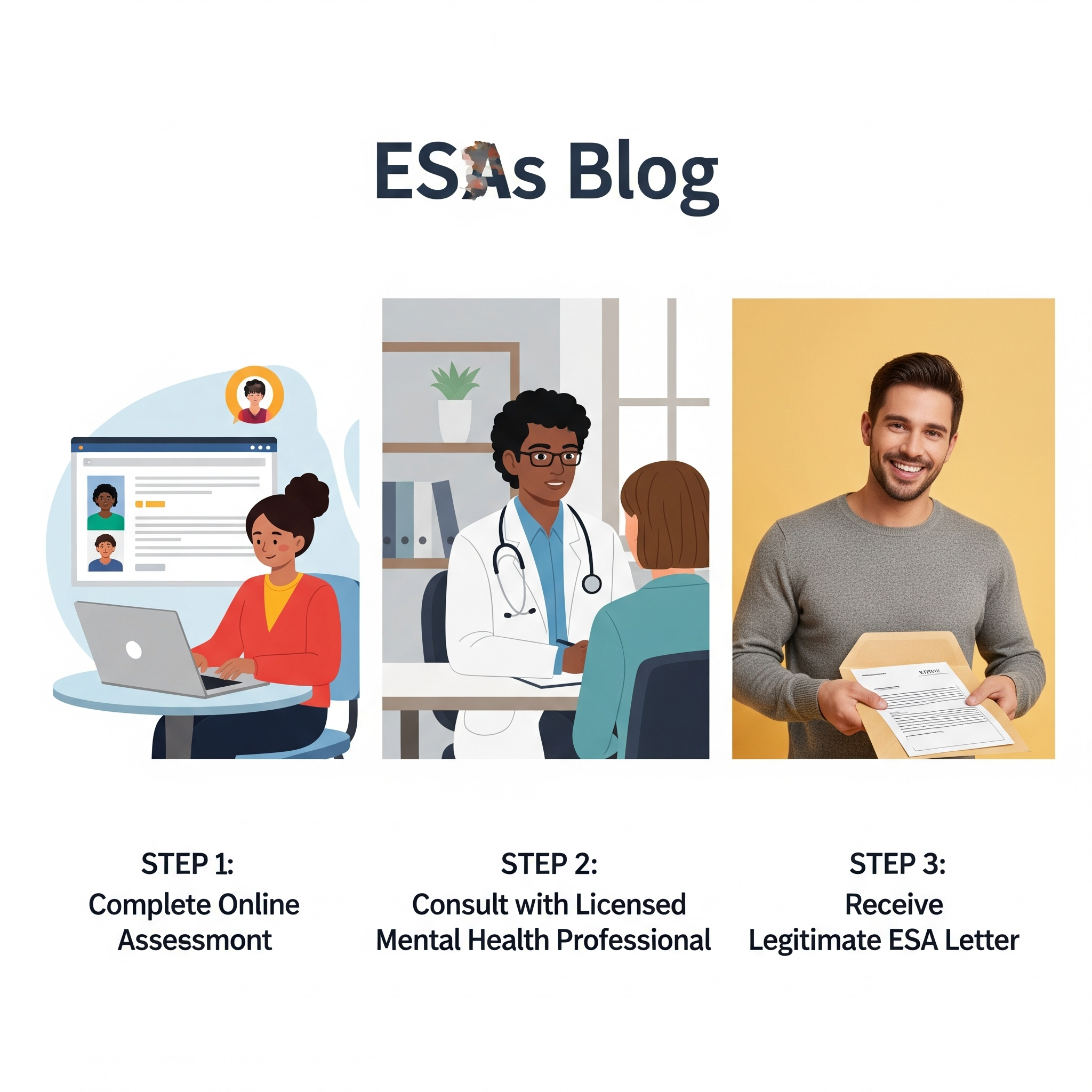For many individuals struggling with mental or emotional disabilities, an Emotional Support Animal (ESA) can be a lifeline, offering comfort and companionship that aids in their well-being. The key to legally recognizing your animal as an ESA is a legitimate ESA letter. But with so much information online, a common question arises: can you get an ESA letter for free? Let’s dive into the realities.
The Short Answer: Generally, No, Not “Free” in the Way You Might Think.
While you might find templates or websites claiming to offer “free” ESA letters, these are almost universally not legitimate or legally valid. A true ESA letter must come from a licensed mental health professional (LMHP) who has evaluated your condition and determined that an emotional support animal is a necessary part of your treatment plan. This evaluation and the professional’s time typically come with a cost.
Why a “Free” Online Template Won’t Work
Online templates you can fill out yourself, or services that offer a letter without a genuine consultation with a licensed professional, lack the legal standing required by federal laws like the Fair Housing Act (FHA). Landlords and housing providers are increasingly aware of fraudulent letters and have the right to request verification from a legitimate LMHP.
Legitimate Ways to Obtain an ESA Letter (and What Might Seem “Free”)
Here’s how you can legitimately obtain an ESA letter, with an understanding of where the “free” perception might come from:
-
Through Your Existing Mental Health Professional: If you are already seeing a therapist, counselor, psychiatrist, or other licensed mental health professional for a diagnosed condition, they are the ideal person to write your ESA letter. In this scenario, the “cost” of the letter itself might be negligible, as it’s part of the ongoing care you’re already paying for (or that your insurance covers). This is the closest you’ll get to a “free” letter.
-
Online Telehealth Services with Licensed Professionals: Many reputable online platforms connect you with licensed mental health professionals who can conduct an evaluation via telehealth and, if you qualify, issue a legitimate ESA letter. While these services have fees associated with the consultation and letter, they can be a convenient and often more affordable option than in-person visits, especially if you don’t have an existing provider. Be sure to choose services that explicitly state they connect you with licensed professionals in your state.
-
Non-Profit Organizations (Limited Cases): Some non-profit organizations, like “Paws for Patrick,” may offer assistance to individuals seeking ESA letters, particularly for specific demographics (e.g., young people aged 0-30). These are rare and often have specific criteria or a “wish program” where services are provided for free or at a reduced cost, relying on donations.
What Makes an ESA Letter Legitimate?
A valid ESA letter, regardless of how you obtain it, must include:
- Written by a Licensed Mental Health Professional (LMHP): This includes therapists, counselors, psychologists, psychiatrists, and in some cases, physicians (though mental health specialists are generally preferred).
- On Official Letterhead: The letter should be on the professional’s official letterhead.
- Professional’s License Information: It must include the LMHP’s license number, type of license, and the state in which they are licensed.
- Statement of Qualifying Disability: The letter must state that you have a mental or emotional disability recognized in the Diagnostic and Statistical Manual of Mental Disorders (DSM-5). It does not need to disclose your specific diagnosis, respecting your privacy.
- Need for an ESA: It must clearly state that an emotional support animal is necessary to mitigate the symptoms of your disability and is part of your treatment plan.
- Date Issued and Signature: The letter must be dated and signed by the LMHP.
- No Expiration Date (Generally): While some states or landlords may request annual renewals, a federal law doesn’t mandate annual renewal. However, the professional may deem it appropriate to set a renewal period.
Beware of Scams!
Be highly skeptical of any service that:
- Offers “instant” ESA letters without a consultation.
- Asks you to simply fill out a questionnaire without speaking to a professional.
- Sells “ESA registration” or “certification” – there is no official federal registry for ESAs.
- Promises “lifetime” ESA letters.
- Charges for vests, ID cards, or other paraphernalia as a requirement for your ESA status. These items are not legally required.
FAQs About ESA Letters and Cost
Q1: Can my family doctor write an ESA letter for me? A1: Yes, a licensed physician can write an ESA letter if they are also a licensed healthcare professional who understands your mental health condition and how an ESA benefits you. However, it’s more common and often preferred to obtain one from a mental health specialist who has expertise in diagnosing and treating mental health conditions.
Q2: How much does a legitimate ESA letter typically cost? A2: The cost of a legitimate ESA letter typically ranges from $150 to $250 or more, which covers the mental health professional’s consultation and the issuance of the letter. This can vary depending on the provider and the services included.
Q3: Are there any federal programs that provide free ESA letters? A3: No, there are no official government programs or services that provide free ESA letters. The process is handled by individual licensed mental health professionals.
Q4: Do I need to renew my ESA letter annually? A4: Federal law does not mandate annual renewal of ESA letters. However, some landlords or housing providers may request a renewed letter annually. Additionally, some states are implementing their own requirements. It’s best to clarify with your housing provider and your LMHP.
Q5: Can I get an ESA letter for any type of animal? A5: Yes, an ESA can be any common domesticated animal, as long as it provides emotional support and does not pose a direct threat to the health or safety of others or cause substantial property damage. Unlike service animals, ESAs do not require specific training.
Q6: Does an ESA letter cover my animal for air travel? A6: As of January 11, 2021, the U.S. Department of Transportation (DOT) no longer considers emotional support animals as service animals under the Air Carrier Access Act (ACAA). This means airlines are generally not required to accommodate ESAs in the cabin free of charge. Most airlines now treat ESAs as regular pets, subject to pet fees and airline-specific policies. Psychiatric Service Dogs (PSDs), which are trained to perform specific tasks related to a person’s mental disability, are still recognized and protected for air travel.
Q7: Will an ESA letter waive pet fees and deposits for housing? A7: Yes, under the Fair Housing Act (FHA), a legitimate ESA letter requires landlords and housing providers to make reasonable accommodations for your emotional support animal, which includes waiving pet fees, deposits, and breed/weight restrictions, even in “no-pet” housing. There are some exceptions, such as owner-occupied buildings with no more than four units, or housing operated by religious organizations and private clubs limiting occupancy to members.
Q8: Can I get an ESA letter if I have anxiety? A8: Yes, anxiety is a common mental health condition that can qualify an individual for an emotional support animal if a licensed mental health professional determines that the animal alleviates symptoms related to your anxiety and is a necessary part of your treatment.
While the idea of a “free” ESA letter is appealing, understanding the legal requirements and legitimate pathways is crucial to ensuring your emotional support animal receives the recognition and protections it deserves. Always prioritize a proper evaluation from a licensed mental health professional.





